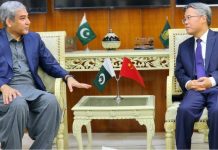By – Hakeem Wadhela
With the end of the 20th century, a new chapter of resistance began in Balochistan. This history was written by the Baloch youth, inspired by the ideals of Nawab Khair Baksh Marri and his companions. They advocated for freedom, self-rule, humanity, and the preservation of Baloch culture, traditions, and languages. The whispers of these ideals spread rapidly across Balochistan, capturing the interest of people from all walks of life who became increasingly invested in the pursuit of freedom and self-rule.
The Baloch youth in schools, colleges, and universities formed small circles, transforming them into a movement for the greater cause of the Baloch people. This movement embraced two vital paths to achieve its goals: the political front and armed resistance against oppressive forces.
In the early 2000s, Balochistan saw the emergence of groups such as the Baloch Liberation Army, Balochistan Liberation Front, and later, the Baloch Republican Army and other armed factions, all actively involved in the struggle for freedom.
Likewise, the Baloch Students Organization, also known as the mother organization for the Baloch struggle, redefined its ideals and practices, aligning itself with the pursuit of freedom. Similarly, the Baloch National Movement, a Baloch political party, severed all ties with the Pakistani political system and reoriented its ideals towards the liberation of Balochistan. The establishment of the Baloch Republican Party was also viewed as a significant step towards the realization of a free Balochistan.
On the other hand, to suppress the ideals of an independent Balochistan, the Pakistan Army, under the rule of dictator General Pervez Musharraf, waged a brutal war against the people of Balochistan. During Musharraf’s dictatorship, respected Baloch leader and chief of the Bugti tribe, Nawab Akbar Khan, was killed in a military operation. Since then, the Pakistani army and its secret services have kept Balochistan under tight surveillance, targeting Baloch political, student, and social activists, leaders, workers, and even supporters of the freedom ideals.
In the past two decades, the Pakistani Army has abducted thousands of innocent civilians, holding them captive in dungeons for years. Many of them endured torture and were killed during their captivity. Those released from captivity often suffer from mental disabilities or endure psychological and physical traumas.
After the end of Pervez Musharraf’s dictatorship in 2008, it was hoped that the democratic government of the Pakistan People’s Party would improve the political situation in Balochistan. However, contrary to some analysts’ predictions, the situation in Balochistan worsened during the tenure of the Pakistan People’s Party. Enforced disappearances dramatically increased, and the Pakistani military introduced the “kill and dump” policy.
Since 2008, the situation in Balochistan has not improved; it has taken a disastrous turn. Despite this, the people of Balochistan remain resolute in their struggle for freedom and self-rule.
While the Pakistani Army, media, politicians, and so-called civil society of Pakistan claim that Balochistan is peaceful and under control, the world’s human rights groups have repeatedly accused Pakistan of human rights violations and inhumane treatment of civilians in Balochistan.
About a decade ago, the Pakistani military establishment devised a plan to manipulate narratives and use propaganda tools to undermine the resistance movements in Balochistan, Khyber Pakhtunkhwa, and Sindh. This project, later known as Pakistan’s “fifth-generation warfare,” involved training thousands of social media activists to engage in propaganda campaigns promoting the Pakistani army and constructing a narrative of nationalism. These activists spread fake news and propaganda against the Baloch Liberation Movement and its leaders, linking them to India, Israel, Iran, and Afghanistan. Additionally, pro-independence Baloch political parties and student organizations were banned to suppress their activities and extinguish the ideals of freedom and sovereignty.
Although the Pakistani Army initially appeared successful in dismantling the Baloch resistance movement on political and military fronts, the Baloch movement adopted a dynamic approach to resist these oppressive tactics. Moreover, the movement took a firm stand against the oppressive mindset within its own ranks, which had caused damage to the movement and the Baloch nation. The ideals of freedom and independence also suffered due to the lack of democratic, academic, institutional reforms, and decision-making processes.
The Baloch movement not only reshaped itself but also gained even greater popularity and activity. While it endured significant losses during this process, the momentum of the movement has not waned. Instead, it continues to gather strength from the masses in Balochistan.
The political situation in Pakistan has become increasingly unstable since the removal of former Prime Minister Imran Khan, the chairman of the Pakistan Tehreek-e-Insaf (PTI) party. This instability escalated on May 9, 2023, when PTI activists burned down buildings, destroyed the houses of military officials, and attacked military monuments to protest against the party chairman’s arrest. Subsequently, a crackdown began against PTI members and leadership. Within a few weeks, numerous PTI leaders and associates of Imran Khan not only resigned from the party but also quit politics.
While in power, PTI ministers and associates of Imran Khan acted as mouthpieces for the Pakistani Army, concealing their crimes against humanity and justifying them by labeling the victims as foreign agents and enemies of Pakistan and Islam. Currently, Imran Khan faces the same regime he once justified on a daily basis. Conversely, those currently supporting the Pakistani military establishment and attempting to remove Imran Khan were the same individuals who pretended to resist them while in the opposition.
It took less than a month for the military establishment to dismantle the political structure of PTI and Imran Khan, as they were creations of the Pakistani military establishment, lacking the ideological strength to withstand the crackdown and consequences for upholding their ideals and principles.
Meanwhile, over the past two decades, Balochistan has been turned into a war zone, with thousands of people abducted and subjected to the worst forms of torture and violence. Countless individuals have been extrajudicially executed and buried in mass graves. Hundreds of hamlets have been burned down and demolished, forcing hundreds of thousands of people to flee from their villages and hometowns. Despite these brutal practices by the Pakistani oppressive forces, the Baloch resistance movement has grown stronger, and today, the Pakistani Army considers the Baloch Liberation Movement the biggest threat to the existence of the Pakistani state.
If the Baloch movement were merely part of an “international political game” or a proxy war against Pakistan, as claimed by the Pakistani government and military establishment, it would never have garnered the support of indigenous people or endured after such immense losses.
The unwavering support that the Baloch Freedom Struggle receives from the masses and the steadfast stance of Baloch political parties, organizations, and armed groups are clear indications that the Baloch people are willing to sacrifice everything for the sake of their ideals of freedom and sovereignty. They refuse to bow before any oppressive regime.
Disclaimer: The views and opinions expressed in this article are those of the author and do not necessarily reflect the official policy or position of The Balochistan Post or any of its editors.






























